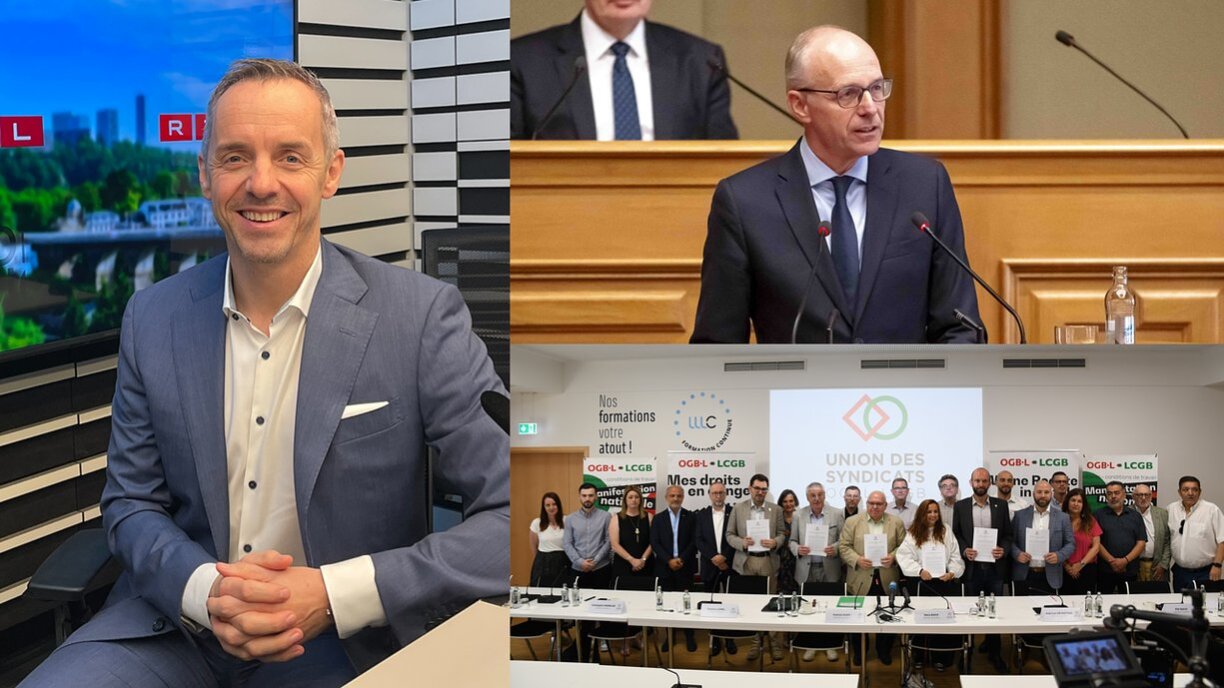
Saturday 28 June at 11am marks the start of the long-awaited demonstration organised by Luxembourg’s main trade unions OGBL and LCGB, with the aim to criticise the current government policy. The unions had already announced they would be taking to the streets in January. The conflicts started when the coalition of the Christian Social People’s Party (CSV) and the Democratic Party (DP) government was signed.
That Luc Frieden would remain true to form following his return from the private sector to politics was, in essence, already laid out in the coalition agreement. The document states that employees and employers are best positioned to determine how working time should be organised within companies. Under the current Labour Agreement, this is regulated through collective agreements negotiated between employers and trade unions.
It is not discussed between employers and employees, as the former can pressure its workers, confirmed by the international conventions implemented decades ago.
Thus the coalition agreement also foresees modifications of collective agreements. They will be revised to offer a better management of work. It states: ‘The aim will be to facilitate agreements between employers and employees while ensuring that these discussions take place on an equal footing’.
There were also indications that Sunday work would be increased from four to eight hours in the Labour Agreement, and that store opening hours would be adjusted – but in consultation with the social partners.
It was no surprise, then, that OGBL president Nora Back already said in March last year: “We have a new government, a conservative-liberal one, where we have to fear that our hard-won rights will come under attack, and where we need to stand up for people’s interests. We have a lot of issues coming our way.”
Things remained relatively calm – until last October, when tensions flared during a meeting of the Standing Committee of Labour, where the government and social partners meet at least three times a year. That’s when the conflict broke out into the open. LCGB president Patrick Dury was furious after the meeting, stating :"The deed the Minister of Labour committed this morning was the worst attack on the Luxembourgish social model we have seen in the last 30 years”.
The Standing Committee of Labour addressed the implementation of the minimum wage directive launched by the former Luxembourgish EU commissioner Nicolas Schmit. As Nora Back already mentioned about Ministry of Labour Georges Mischo, “he simply could not comment that he was adhering to the Luxembourgish law which states that the collective agreement is discussed between employers and unions. That is exactly what we want to talk about. How can we create more collective agreements if we hold on to that model? The model has proven its worth over the years and it has also guaranteed the social peace within Luxembourg as well.”
Aside from that, the directive contains a non-regression clause. There cannot be any backtracking, no curtailing of employees’ rights. Labour Minister Georges Mischo did not appear particularly confident when it came to the current national and upcoming European legislation. He placed the blame on the trade unions.
“They walked out because they weren’t satisfied that I didn’t make a statement in favor of a monopoly over the negotiating base within companies. And of course, there are also companies where neither OGBL nor LCGB members are represented. There are companies with only neutral delegates. That means they wouldn’t be able to negotiate a collective agreement. I just can’t imagine that.”
Even that has been handled by legislation. Independent representatives can give a mandate to unions to negotiate with their employer. These past few weeks there was rarely a week where Labour Minister Mischo did not struggle to explain himself and backtrack. The contradictions have become more and more apparent. To the press, Mischo rectified: “I wanted to clarify something: I did not take anything from the unions, not one thing.”
Since it is still unclear what the actual aim is, the Labour Minister underlined in the Chamber that he never mentioned the unions’ monopoly being taken away from them. He confirmed once again that had not been his intention. PM Luc Frieden had also confirmed Georges Mischo’s statement in October. Nevertheless, the situation has not calmed down, as the government’s statements have remained to contradictory.
“Simultaneously we need to analyse the contents of the collective agreements, to see whether things need to change at business levels or concerning the management of working hours”, asserted Luc Frieden after a government council meeting.
However, taking away the management of working hours from the unions does mean violating their territory of work.